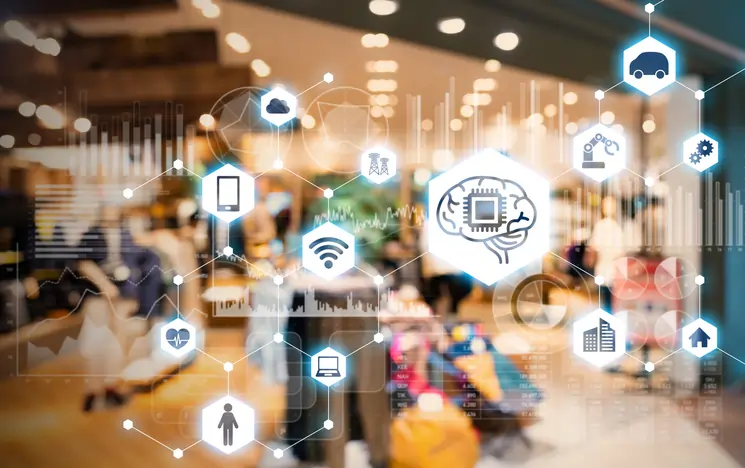
How artificial intelligence is shaping the future of e-commerce: a deep dive into tomorrow’s shopping
In the dynamic realm of digital retail, the advent of Artificial Intelligence (AI) stands as a beacon of transformative power, reshaping the contours of e-commerce with every passing moment. This article embarks on an exploratory journey into how AI is not just influencing but fundamentally reconstructing the future of e-commerce, ushering in an era of unparalleled personalization, efficiency, and engagement.
Artificial intelligence: the new frontier in e-commerce
The Inception of AI in E-commerce: At the heart of modern e-commerce, Artificial Intelligence has emerged as the pivotal force driving innovation. From personalized shopping experiences to operational automation, AI’s integration into e-commerce platforms signifies a leap towards a more intuitive, user-centric shopping paradigm.
AI and Personalized Shopping Experiences: Personalization, the buzzword of the decade, has found its truest expression through AI technologies. By analyzing vast datasets, AI algorithms offer tailor-made product recommendations, creating a shopping experience that feels uniquely personal to each customer.
Operational Efficiency through AI: Beyond customer-facing features, AI enhances e-commerce operations by streamlining inventory management, optimizing logistics, and automating customer service through chatbots, thereby reducing overheads and improving service delivery.
Trends shaping the ai-e-commerce nexus
The Rise of Voice-Assisted Shopping: Voice recognition technology has made shopping as simple as speaking into a device. This hands-free convenience, powered by AI, is setting new benchmarks for user experience in e-commerce.
AI-Powered Visual Search: The ability to search for products using images, courtesy of AI, has revolutionized product discovery, offering a more intuitive and efficient shopping experience.
Predictive Analytics in Inventory Management: AI’s predictive capabilities are ensuring that e-commerce platforms can better manage their inventory, reducing waste and ensuring that popular items are always in stock.
Challenges and opportunities
Navigating Data Privacy Concerns: As AI relies heavily on data, e-commerce platforms face the challenge of balancing personalization with privacy. Ensuring data security while leveraging AI for enhanced user experiences remains a critical concern.
Sustainable and Ethical AI Use: The conversation around AI’s role in e-commerce also extends to its ethical implications, particularly in terms of job displacement and environmental impact. Developing sustainable AI solutions that augment rather than replace human roles is crucial.
Customer service revolutionized by ai
Chatbots and AI Assistants: AI-driven chatbots have transformed customer service, offering instant, 24/7 assistance. Their ability to learn from interactions enables them to provide increasingly personalized and helpful support.
Enhancing Customer Loyalty with AI: AI’s predictive analytics help e-commerce platforms anticipate customer needs, fostering loyalty through anticipatory service and personalized offerings.
The future of e-commerce with ai: what lies ahead?
Integrating AR with AI for Immersive Shopping: The fusion of Artificial Intelligence with Augmented Reality (AR) promises a shopping experience where customers can virtually try products before purchase, significantly enhancing the decision-making process.
Sustainability and AI: Future AI advancements are expected to focus on sustainable practices, from reducing e-commerce returns to optimizing delivery routes for minimal environmental impact.
Global E-commerce and AI’s Role in Expansion: AI is pivotal in breaking down geographical and linguistic barriers in e-commerce, making global markets more accessible to retailers and consumers alike.
Frequently asked questions
How does ai personalize shopping experiences?
Artificial Intelligence personalizes shopping experiences by leveraging data analytics and machine learning algorithms to understand individual customer preferences, behaviors, and purchasing history. This information allows AI systems to predict what products or services a customer is likely to be interested in. For example, if a customer frequently purchases or searches for fitness equipment, AI can recommend related products such as workout attire, nutritional supplements, or new fitness gadgets. This level of personalization makes the shopping experience more relevant and engaging for the user, increasing the likelihood of purchase and customer satisfaction.
Can AI improve e-commerce security?
Yes, AI significantly enhances e-commerce security by employing sophisticated algorithms to detect and prevent fraudulent activities in real-time. AI systems can analyze purchasing patterns and flag transactions that deviate from the norm, such as attempts to purchase high-value items in rapid succession or from a new geographical location. Additionally, AI can improve payment security by verifying the authenticity of transactions through biometric verification methods like facial recognition or fingerprint scanning, adding an extra layer of security to protect against identity theft and unauthorized purchases.
What role does AI play in customer service?
AI plays a transformative role in customer service within the e-commerce sector through the use of chatbots and virtual assistants. These AI-driven tools can handle a wide range of customer inquiries 24/7, from tracking orders and processing returns to answering product-related questions. They learn from each interaction, which enables them to provide more personalized and accurate responses over time. This not only enhances the customer experience by offering immediate assistance but also reduces the workload on human customer service representatives, allowing them to focus on more complex queries.
How does AI impact e-commerce logistics?
AI has a profound impact on e-commerce logistics by optimizing operations through predictive analytics and automation. It can forecast demand for products, helping businesses to manage their inventory more efficiently and reduce stockouts or overstock situations. AI algorithms can also optimize delivery routes, taking into account factors such as traffic conditions, delivery windows, and vehicle capacity, which minimizes delivery times and reduces costs. Furthermore, AI can automate warehousing operations, including sorting, packing, and storing goods, which enhances productivity and accuracy in the supply chain.
Will AI replace human jobs in e-commerce?
While AI automates many tasks within e-commerce, it is unlikely to replace human jobs entirely. Instead, AI is expected to augment human capabilities and create new opportunities for jobs that require emotional intelligence, creative thinking, and strategic planning—areas where AI cannot fully replicate human performance. The focus is on leveraging AI to handle repetitive tasks and data analysis, allowing humans to concentrate on more value-added activities such as customer engagement, product development, and strategic decision-making. It’s about finding the right balance between technology and human touch to drive innovation and enhance customer experiences.
How can small e-commerce businesses leverage AI?
Small e-commerce businesses can leverage AI by adopting technology solutions tailored to their scale and needs. Tools such as AI-driven marketing platforms can help them target potential customers more effectively through personalized advertisements and email marketing campaigns. Small businesses can also use chatbots to offer 24/7 customer service, improving customer satisfaction and engagement. Additionally, AI-powered analytics tools can provide insights into customer behavior and market trends, enabling these businesses to make informed decisions about inventory management, product offerings, and pricing strategies. By adopting AI, small e-commerce businesses can compete more effectively with larger players, offering personalized experiences that today’s consumers expect.
The journey of e-commerce, propelled by the winds of Artificial Intelligence, is steering towards a future where shopping is not just a transaction but an experience — personalized, efficient, and seamless. As we stand on the brink of this new era, the fusion of AI and e-commerce holds the promise of unlocking unprecedented opportunities for businesses and consumers alike. Embracing AI is not just about adopting new technologies but about reimagining the future of commerce in a way that is more inclusive, innovative, and insightful. The future of e-commerce, shaped by AI, beckons with the allure of endless possibilities, inviting us to explore, adapt, and thrive in the digital marketplace of tomorrow.

